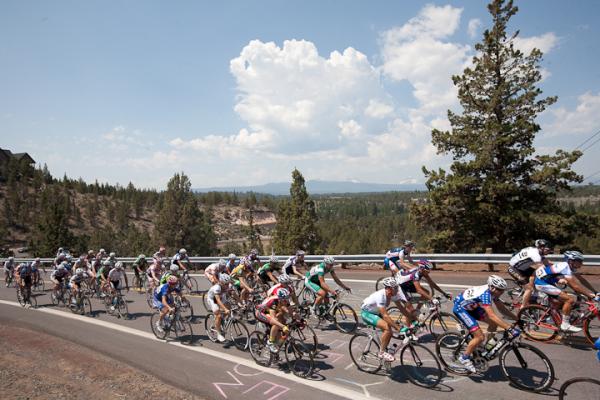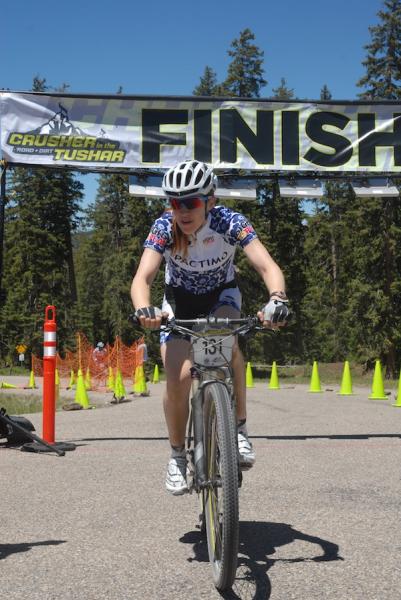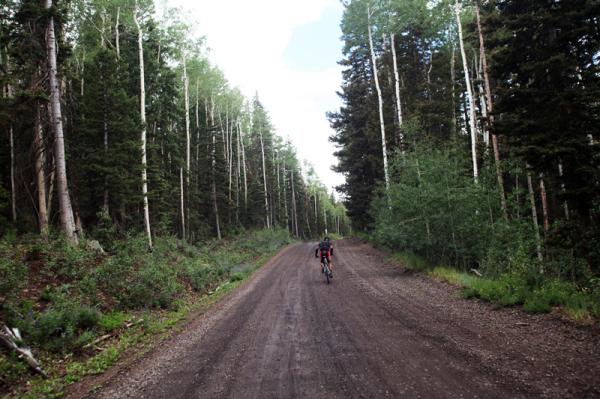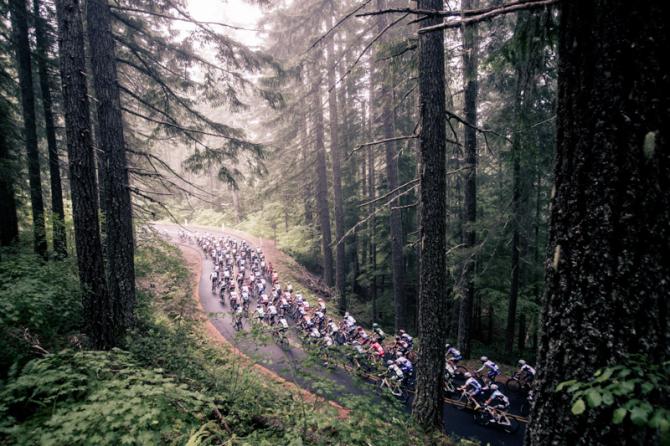USA Cycling enforcement of UCI participation rules shakes up Oregon events
Swindlehurst left wondering what to do with mixed Crusher in the Tushar event
The latest race content, interviews, features, reviews and expert buying guides, direct to your inbox!
You are now subscribed
Your newsletter sign-up was successful




Changes this season in how USA Cycling cooperates with non-sanctioned events and how it enforces UCI rules across all disciplines will shake up the organization of several national events and exclude riders on UCI-registered pro teams from some competitions.
USA Cycling announced late last season that it will no longer allow dual sanctioning for events that previously used USA Cycling for the pro and elite races while the amateur categories were sanctioned by an unrecognized organization or operated without a sanctioning body.
"The decision by USA Cycling going forward is that we will not accept a permit for an event that is dual sanctioned (meaning an event that is held the same day on the same course)," USAC Communications Director Bill Kellick informed Cyclingnews in an email.
Kellick said dual sanctioning blurs the lines between when one organization’s insurance is in effect versus another organization's. Lack of access to the venue and course before USA Cycling takes over as sanctioning body creates a liability issue.
"Many of the tasks required by USA Cycling officials at a dual-sanctioned event must be conducted prior to USA Cycling’s insurance coverage that is outlined in the permit," Kellick explained in the email.
The new policy is especially pertinent for races in Oregon, a state that operates under the independent Oregon Bicycle Racing Association and not under the USAC umbrella. The Cascade Cycling Classic, a National Race Calendar event and the longest running stage race in the US, the Mt. Hood Cycling Classic and the US Gran Prix of Cyclocross races in Bend will no longer be able to simultaneously sanction amateur races under OBRA and pro/elite races under USAC at the same event.
USGP director Joan Hanscom told Cyclingnews that the Bend races have been inscribed with the UCI for 2013, but she declined to comment on how the new USAC policy would alter the event.
The latest race content, interviews, features, reviews and expert buying guides, direct to your inbox!
Chad Sperry, owner of the Mt. Hood race and director of the Cascade Cycling Classic, said both of those races will operate fully under USAC sanctioning this season. Sperry said he crunched the numbers, and unlike most Oregon races, the majority of riders for Mt. Hood and Cascade come from out of the state and hold USAC licenses.
"So if we had to choose one sanctioning body, we went with the majority of where our participants and clientele have their registration and licensing from, and with this it was USA Cycling," he said. "A secondary aspect was that with the loss of the pro teams we would see a huge decline in overall sponsorship."
Sponsorship is driven by media coverage and the ability to attract spectators and crowds, Sperry said, and races would see a devastating financial impact without the pro element. The inability to use dual sanctioning will have a negative impact on registrations compared to previous years because many Oregon racers do not hold a USAC license, Sperry said, but both race organizations had to consider the health and future of the events when deciding between OBRA or USAC.
"I'm sure that there were some very frustrated people within the Oregon Bicycle Racing Association for the decision we made," he said. "But the decision really came down to the bottom line; do we want to continue these events?"
Changes limit options for non-sanctioned events
USA Cycling's decision to begin implementing strict enforcement of UCI Rule 1.2.019, which forbids riders on UCI-registered pro teams from competing in events that have not been been recognized by a national federation, a continental confederation or the UCI, will further complicate matters for non-sanctioned events like July's Crusher in the Tushar, Burke Swindlehurst's hybrid event in Utah that tests riders over 70 miles of paved and gravel roads.
The three-year-old event sold 350 spots for this year's race in the first 24 hours that registration was open, and it sold out a few weeks later at 500. Professional riders from UCI-registered teams have won the event since its inception in 2011. Road pro Tyler Wren won the first two editions of the men's race while riding for the UCI Continental Jamis-Sutter Home teams. Canadian Clara Hughes won the women's race in 2011, and Gretchen Reeves won last year.
The new ruling means Wren won't be able to defend his title this year, and other pros on UCI teams will have to miss out as well. And now that dual sanctioning is no longer an option, Swindlehurst said, he may have to consider sanctioning the 2014 event under USAC.
"I've definitely given this a ton of thought, especially at the very beginning when trying to decide how I wanted to approach it," Swindlehurst said. "A large part of my decision went into fact that I identified who my customers were and I started getting a lot of feedback from people. I knew that 70 percent of my customers were going to come from here in Utah and that I was going to be drawing primarily on the cyclo-cross and mountain bike crowd."
Utah has four major non-sanctioned mountain bike and cyclo-cross series, so many riders do not hold a USAC license.
"I anticipated that if I did go with USAC sanctioning, there would be quite a bit of push back from what is essentially my core group of participants," Swindlehurst said. "The other element is that because it isn't a road race and is isn't a mountain bike race, how would I define categories? There are definitely a lot of ins and outs there."
Swindlehurst said he believes USAC would work with him on sorting out such issues, but he's still not sure sanctioning is a good fit for what is still very much a grassroots event.
"I still have people who come out and this is the only event they do all year," he said. "This is the only event that really intrigues them. To ask them to purchase license - even a one-day license for that matter - I've gotten general feedback that there would be some resistance to that."
But Swindlehurst's desire to embrace the race's innovative nature and grassroots appeal conflicts with his desire to attract many of the pro riders he considers close friends.
"My vision for the future is that I would love to have an event that attracted the top pros from around the world and have something that's really big and monumental," he said. "But at the same time, let's say I did USAC licensing one year and wanted to get it as national calendar event: do mountain bikers get MTB points, do road riders get road points?
"It's still a unique enough event that there's some hurdles in there for me," he said. "It's a bridge that I'm certainly going to cross in the future, and I do anticipate having sanctioning - at least for the pro event - in the future for just that reason."
Fairness for Continental riders questioned
Although Swindlehurst is considering future USAC sanctioning in order to have pro riders at his race, he also questioned the fairness of suddenly enforcing Rule 1.2.019 for many of the relatively low-paid Continental riders that it will affect.
"It's self-serving for me as a promoter, obviously, but I do have the perspective as a former rider, too," he said. "And if those rules had been applied to me when I was racing, it would have prevented me from making money and doing my job, and that's basically what it comes down to."
Enforcing the rule is appropriate for ProTour and Pro Continental riders, who are guaranteed a minimum salary and have an abundance of races in which to participate, Swindlehurst said, but putting Continental riders under the same constraints hinders their ability to ply their trade and earning a living.
"Probably 25 to 40 percent of the riders at the Continental level are making anywhere from $5,000 to $7,000 a year, and that's not a livable wage," he said. "It helps for them to be able to go out to a high-quality, non-sanctioned race that offers good prize money. To have to sit that out is just not fair."
As an example, Swindlehurst referred to the year he won $2,000 at the non-sanctioned Teva Mountain Games - a race that this year led to fines and threats of suspension for several pros who competed.
"I was putting food on my table at that point with that money," Swindlehurst said of the prize money. "It wasn't just a cherry on top at the end of the year. Professional bike racing at the Continental level is not that lucrative."
Swindlehurst emphasized that he is not a "dyed-in-the-wool" hater of governing bodies, and he believes USA Cycling has done a lot for the sport, especially in the past 10 years, but as an event promoter who is running an unsanctioned race, and as a retired professional who knows what it's like to live month to month he wanted to address the fairness of USA Cycling's decision to enforce the long-ignored rule for Continental pros.
"I think a lot of riders are going to have very strong feelings about this," he said. "But I don't know how many of them are going to come forward because spots on these Continental teams are very hard to come by. The domestic peloton is down by something like 60 riders, so nobody's going to want to go out on a limb and possibly jeopardize their standing within the team by rocking the boat - even if they wanted to."
Growing up in Missoula, Montana, Pat competed in his first bike race in 1985 at Flathead Lake. He studied English and journalism at the University of Oregon and has covered North American cycling extensively since 2009, as well as racing and teams in Europe and South America. Pat currently lives in the US outside of Portland, Oregon, with his imaginary dog Rusty.
